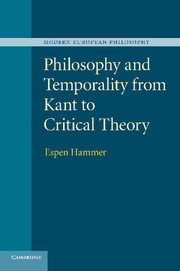Book contents
- Frontmatter
- Contents
- Acknowledgments
- Introduction
- 1 The historicity of time
- 2 Modern temporality
- 3 Two responses to the time of modernity
- 4 Hegel's temporalization of the absolute
- 5 Schopenhauer and transcendence
- 6 Time and myth in the early Nietzsche
- 7 Recurrence and authenticity: the later Nietzsche on time
- 8 Heidegger on boredom and modernity
- 9 A modernist critique of postmodern temporality
- Conclusion
- Bibliography
- Index
- References
3 - Two responses to the time of modernity
Published online by Cambridge University Press: 21 April 2011
- Frontmatter
- Contents
- Acknowledgments
- Introduction
- 1 The historicity of time
- 2 Modern temporality
- 3 Two responses to the time of modernity
- 4 Hegel's temporalization of the absolute
- 5 Schopenhauer and transcendence
- 6 Time and myth in the early Nietzsche
- 7 Recurrence and authenticity: the later Nietzsche on time
- 8 Heidegger on boredom and modernity
- 9 A modernist critique of postmodern temporality
- Conclusion
- Bibliography
- Index
- References
Summary
In this chapter I consider two accounts of rationality, both of which can be construed as responding to the predicament that has been outlined. In the Kantian tradition, there is in addition to the means–end orientation of purposive-rational action a strong emphasis on rational self-determination. I argue that while the project of rational self-determination may seem to promise a way out of the alienating conditions of modernity, it does not provide resources for reconceptualizing temporality such that the problems of meaning and transitoriness will be overcome. The Aristotelian tradition, by contrast, offers other resources for thinking about action, some of which are relevant for thinking about temporality. I argue, however, that its peculiar combination of anti-modern rancor and a desire to retrieve elements of ancient theories of virtue makes it unhelpful as a critical tool by which to criticize and, possibly, reconceptualize our relation to time.
Kant, Habermas, and autonomy
The philosophical responses to the disenchantment of time, starting with Kant and Hegel, have been both varied and vigorous. One particularly influential response is favored by philosophers committed to some form of neo-Kantianism. Their strategy is to accept modernity's consciousness of time as an unavoidable fact while rejecting a purely instrumentalist interpretation of it. In a lecture entitled “Modernity's Consciousness of Time,” published as the opening chapter of his 1987 study The Philosophical Discourse of Modernity, Jürgen Habermas starts out by pointing to Baudelaire's claim that the erosion of social convention which marks the onset of modernity makes possible a strange new perception of, especially, aesthetic objects as being both transient and immutable.
- Type
- Chapter
- Information
- Philosophy and Temporality from Kant to Critical Theory , pp. 58 - 70Publisher: Cambridge University PressPrint publication year: 2011



